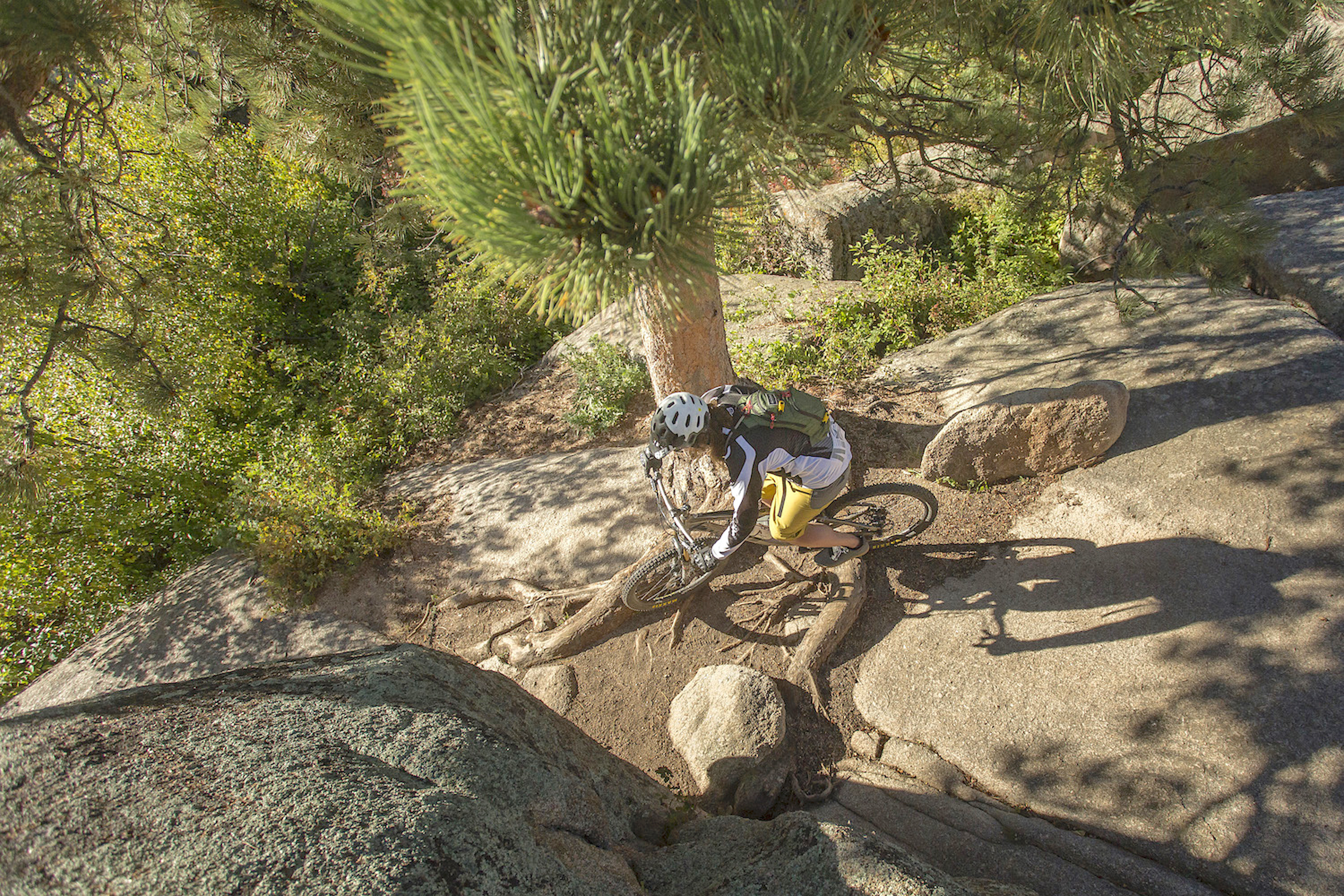Federal outdoor rec bill that protects wilderness climbing advances

A mountain biker threads between boulders at Curt Gowdy State Park. (Brian Harrington/BHP Imaging)
FROM WYOFILE:
EXPLORE Act also bundles policies to create more long-distance bike trails, build green spaces and streamline outfitter and guide permitting. Wyoming’s Rep. Hageman supported it.
Federal legislation that would preserve the practice of installing permanent climbing anchors in the wilderness — an activity that has long divided recreation advocates and conservationists — passed the U.S. House of Representatives last week.
The Expanding Public Lands Outdoor Recreation Experiences Act, known as the EXPLORE Act, is a package of more than a dozen policy measures aimed at improving outdoor recreation on federal lands. It bundles together provisions that would create more long-distance bike trails, streamline permitting for outfitters and fund parks and green spaces.
The act’s sentiment aligns with Wyoming’s embrace of outdoor recreation as a growing economic driver. Wyoming’s outdoor recreation economy increased to $2.02 billion, or 4.1% of the state’s GDP in 2022, according to the U.S. Bureau of Economic Analysis. The state created a trust fund in 2023 to allocate grants to outdoor recreation projects, and signed a law in March that will authorize a governing board to allocate those infrastructure and access grants.
Also included in the EXPLORE Act is the Protecting America’s Rock Climbing Act, which safeguards practices around bolting fixed anchors in wilderness. Climbing access advocates, who say the practice is necessary for safety in Wyoming destinations like the Wind River Range, cheered its passage.
The act “benefits climbers, our public lands, local communities, and all of us who love recreating and spending time in nature,” Access Fund Executive Director Heather Thorne said in a statement. She urged the Senate to follow suit “so that President Biden can sign legislation protecting sustainable wilderness climbing access into law.”
The EXPLORE Act passed by voice vote Tuesday. Wyoming’s Rep. Harriet Hageman supported it, according to her staff.
To bolt or not to bolt?
The debate over installing permanent climbing anchors in the wilderness dates back decades, but was reignited with recent federal proposals.
The Protecting America’s Rock Climbing Act that ended up in the policy bundle was introduced in March. The same month, U.S. Sens. John Barrasso (R-Wyoming) and Joe Manchin (D-West Virginia) introduced America’s Outdoor Recreation Act, which would also recognize that recreational climbing “is an appropriate recreational use” in wilderness and allow fixed anchors along routes.
Then in November, the United States Forest Service and National Park Service proposed guidelines for managing climbing. The directives explicitly prohibit fixed anchors as “installations” in wilderness areas.
While climbing advocates say fixed anchors are a mandatory safety measure and non-intrusive feature that blends in with rocks, wilderness advocates who oppose them say wilderness designations deserve the most stringent protections, and fixed anchors undermine The Wilderness Act’s foundations.
“I think it’s an incredibly slippery slope,” former executive director of the Jackson Hole Conservation Alliance Franz Camenzind told WyoFile. “What’s the next one, bikes in wilderness?”
There are many climbing routes in Wyoming wilderness, including in the Wind River Range, Bighorn Mountains and Absarokas, and climbing advocates say a prohibition would be detrimental to the sport.
Wide-ranging support
The EXPLORE Act addresses much more than climbing provisions. In a November congressional hearing, representatives and others stressed that the bipartisan package represents years of work to improve many aspects of outdoor recreation, including increasing accessibility for veterans and addressing outdoor recreation’s strain on things like housing. Many also emphasized the value of harnessing the industry’s economic might.
“Whether you are a hunter, fisher, rock climber, target shooter, paddler, adventurer, there is something in this legislation for you,” Rep. Tom Tiffany (R-Wisconsin) said. “That’s because the central theme of the EXPLORE Act is improving access for the hundreds of millions of people who recreate on our public lands annually across the country.”
During that hearing, National Forest System Deputy Chief Chris French acknowledged the Forest Service’s proposed guidance on rock climbing, but indicated the conflicting proposal did not create an insurmountable hurdle. “We are committed to our public comment periods and creating a workable solution for all users,” French said.
Fast forward four months, and the EXPLORE Act’s passage out of the House last week was followed by a raft of celebratory statements.
“America’s outfitters have been working toward this for years and couldn’t be more pleased,” America Outdoors Executive Director Aaron Bannon said.
“The EXPLORE Act will improve management for climbing and mountain biking, enhance how agencies manage outdoor recreation and invest in parks where they are needed most,” said Louis Geltman, vice president of policy and government relations for Outdoor Alliance.
“The way Americans recreate is changing at break-neck speeds,” said Becky Humphries, president and CEO of the Theodore Roosevelt Conservation Partnership. “The EXPLORE Act will ensure that our agencies and the public have the tools they need to keep up with the dynamic recreation patterns of our nation.”
“Many families struggle to safely or affordably access our public lands,” Robert Scott, deputy director of federal policy for Sierra Club, said. “Whether it’s inaccessible trails that people with mobility issues cannot use, a lack of parks within walking distance of a family’s neighborhood, or the increasing costs of planning large trips to visit a national park, all our communities deserve to enjoy nature and outdoor recreation amenities.”
The EXPLORE Act, he continued, “will unlock opportunities for many more families nationwide.”
WyoFile is an independent nonprofit news organization focused on Wyoming people, places and policy.
This story was posted on April 15, 2024.








